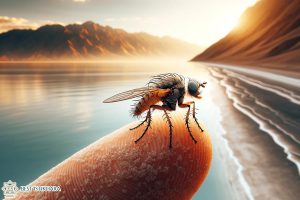Is Termite Eggs Meat Halal?

The consumption of termite eggs, particularly in African regions, raises intriguing questions about their status in Islamic dietary laws. Termites, known for their ecological significance, produce eggs that are a delicacy in various African cultures. Understanding whether these eggs are halal involves examining Islamic teachings on consuming insects and their byproducts. This section explores termite eggs’ religious, nutritional, and cultural aspects, providing a comprehensive overview of their place in the Islamic diet. By delving into scholarly interpretations and regional practices, we aim to clarify whether termite eggs can be considered permissible (halal) for Muslims. Click to get more information about halal vs haram topics discussed in today’s world.
Islamic Perspective on Insects and Their Eggs
Islamic dietary laws, derived from the Quran and Hadith, provide guidelines on what is permissible (halal) and forbidden (haram) to consume. Insects occupy a unique space within these laws. While most animals’ consumption and byproducts are clearly defined, insects present a more complex issue. Generally, the permissibility of eating insects depends on interpretations by Islamic scholars, cultural practices, and the specific type of insect in question. This section delves into the general rulings and scholarly opinions regarding the consumption of insects and their eggs within the Islamic context.
General Ruling on Insect Consumption in Islam
The general ruling on insect consumption in Islam varies among scholars and Islamic schools of thought. The Hanafi school, for instance, typically prohibits the consumption of insects, with exceptions for locusts, which are explicitly mentioned as permissible in some Hadith. Other schools, like the Maliki and Shafi’i, may allow the consumption of certain insects if they are traditionally eaten and deemed non-harmful. Insects that feed on filth or cause harm are generally considered haram.
Eggs from insects are subject to similar scrutiny. If the insect itself is halal, its eggs are also usually considered halal. However, if the insect is haram, its eggs would also be deemed haram. This nuanced approach requires considering both the type of insect and the local dietary customs to determine the permissibility of consuming insect eggs.
Termite Eggs: Halal or Haram?
Whether termite eggs are halal or haram is complex and hinges on various factors within Islamic jurisprudence. While insects such as locusts are explicitly mentioned in Islamic texts as permissible, the status of other insects, including termites and their eggs, requires careful consideration of scholarly opinions and Islamic dietary laws.
Scholarly Opinions on Termite Eggs
Islamic scholars’ opinions on the consumption of termite eggs vary. Some scholars, particularly from the Maliki and Shafi’i schools, might permit their consumption if they are deemed non-harmful and traditionally consumed in some cultures. However, the Hanafi school generally takes a stricter stance, often prohibiting the consumption of most insects except locusts. Local scholars may lean towards permissibility in regions where termite eggs are a part of the traditional diet, provided there is no explicit harm associated with their consumption. It is crucial to consult local religious authorities who can provide guidance based on Islamic texts and cultural practices.
Key Factors Determining Halal Status
Several key factors determine the halal status of termite eggs:
- Type of Insect: If the insect is halal, its eggs are likely halal. Since locusts are the only explicitly mentioned halal insects in Hadith, other insects like termites require further scrutiny.
- Harmfulness: If consuming termite eggs is harmful, they would be considered haram. Islamic dietary laws emphasize the importance of consuming only what is beneficial and non-harmful.
- Cultural Practices: In regions where termite eggs are a traditional food, local scholars may rule them halal if there is a precedent and no harm is associated with their consumption.
- Source and Cleanliness: The conditions under which termite eggs are harvested and consumed also play a role. Ensuring they are clean and free from harmful substances is essential.
By evaluating these factors, one can determine whether termite eggs are permissible in accordance with Islamic dietary laws.
Nutritional Value of Termite Eggs
Termite eggs are a rich source of nutrition, especially in regions where they are traditionally consumed. These eggs are packed with essential nutrients that contribute to a balanced diet. They contain high protein levels crucial for muscle development and repair. Additionally, termite eggs are a good source of fats, vitamins, and minerals, which provide energy and support various bodily functions. The unique composition of these eggs makes them a valuable addition to diets in many cultures, particularly in Africa.
Health Benefits
The health benefits of consuming termite eggs are significant, given their nutrient-dense profile:
- High Protein Content: Termite eggs are an excellent source of protein, which is vital for building and repairing tissues, producing enzymes and hormones, and supporting overall body functions. This makes them particularly beneficial for individuals with increased protein needs, such as children, athletes, and the elderly.
- Rich in Essential Fats: Eggs contain healthy fats that are important for brain health, energy production, and the absorption of fat-soluble vitamins (A, D, E, and K). These fats also help maintain healthy cell membranes.
- Vitamins and Minerals: Termite eggs are rich in essential vitamins and minerals such as iron, zinc, magnesium, and B. Iron is crucial for producing hemoglobin, zinc supports immune function, magnesium is vital for muscle and nerve function, and B vitamins are essential for energy metabolism and red blood cell formation.
- Antioxidant Properties: Some studies suggest termite eggs may have antioxidant properties, which help protect the body from oxidative stress and reduce the risk of chronic diseases such as heart disease and cancer.
- Digestibility: The protein and nutrients in termite eggs are highly digestible, making them an efficient food source for quick energy and nutrition.
Incorporating termite eggs into the diet can contribute to overall health and well-being, particularly in regions where other sources of these nutrients might be scarce.
Regional Practices and Acceptance
The consumption of termite eggs varies significantly across different regions, particularly in Africa, where these eggs are a traditional food source in many communities. Cultural practices and acceptance of termite eggs are deeply rooted in these regions’ local traditions and dietary habits. Understanding these practices provides insight into how termite eggs are harvested, prepared, and consumed and sheds light on their nutritional and cultural significance.
Consumption of Termite Eggs in African Countries
In various African countries, termite eggs are considered a delicacy and an essential part of the local diet. For instance:
- Nigeria: In rural parts of Nigeria, termite eggs are collected during specific seasons when termites are most active. They are often consumed raw, roasted, or added to dishes for their rich flavor and nutritional value. The collection and consumption of termite eggs are integrated into the local customs and are considered a sustainable food source.
- Uganda: In Uganda, termite eggs are highly prized and often sold in local markets. They are typically fried or boiled and served as a snack or side dish. The practice of consuming termite eggs in Uganda highlights their importance in local diets, particularly in areas where other protein sources might be less accessible.
- Kenya: In Kenya, especially among certain ethnic groups, termite eggs are harvested and eaten as part of traditional meals. They are known for their high protein content and are often included in recipes passed down through generations. Using termite eggs in Kenyan cuisine reflects the adaptability and resourcefulness of local food practices.
- South Africa: Termite eggs are also consumed in parts of South Africa, which are considered nutritious food sources. They are often incorporated into various dishes and are appreciated for their unique taste and texture.
These regional practices demonstrate termite eggs’ cultural acceptance and significance in African diets. The methods of harvesting and preparing termite eggs are tailored to local environments and traditions, making them an integral part of the food culture in these regions. The consumption of termite eggs provides essential nutrients, supports sustainable food practices, and preserves cultural heritage.
Conclusion
In summary, the permissibility of termite eggs under Islamic dietary laws is a nuanced issue, dependent on various factors such as scholarly interpretations, the harm or benefit of consumption, and regional dietary practices. Termite eggs, rich in protein and essential nutrients, are a traditional food source in many African cultures, where they are valued for their nutritional benefits and cultural significance. While some Islamic scholars may permit their consumption based on local customs and the absence of harm, Muslims need to seek guidance from local religious authorities to ensure adherence to halal dietary laws. Understanding these perspectives helps integrate traditional practices with religious guidelines.






